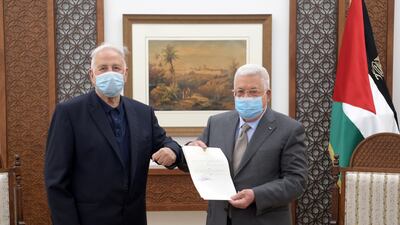Palestinian President Mahmoud Abbas announced dates for the first Palestinian elections in more than 15 years, setting legislative polls for May 22 and August 31 and a presidential vote on July 31.
The announcement followed months of talks between Mr Abbas's Fatah party, which controls the Palestinian Authority based in the occupied West Bank, and its rival Hamas - the Islamist group that controls the coastal enclave of Gaza.
The long-standing rivalry between the two factions was blamed for stalling progress towards a new vote. But Fatah and Hamas have lately been engaged in unity talks, reaching an agreement in principle in September to hold elections in 2021.
Hamas welcomed Mr Abbas's announcement on Friday.
"In recent months, we have worked to overcome obstacles in order to reach this day," it said in a statement.
Hamas said it wanted "free elections in which voters can express themselves without pressure and without restrictions, in all fairness and transparency".
A statement on the official Palestinian Wafa news agency said Mr Abbas had signed a presidential decree concerning elections, specifying May and July dates.
The decree said the elections to the Palestinian Legislative Council, the law-making body of the Palestinian Authority, would be followed by elections to the Palestinian National Council, the legislative body of the Palestinian Liberation Organisation, on August 31.
While the PA administers the occupied Palestinian territories, the PLO is the UN-recognised representative of Palestinians worldwide.
"This announcement was eagerly awaited," Palestinian analyst Arif Jaffal, head of the Arab World Democracy and Electoral Monitor, told AFP.
"It is a very important step," he said.
The 2005 Palestinian presidential vote gave Mr Abbas victory with 62 per cent support to replace the late Yasser Arafat.
The statement from Mr Abbas said he expected polls will be held "in all governorates of Palestine, including East Jerusalem", which was annexed by Israel following the 1967 Arab-Israeli War but is considered occupied territory.
Israel bans all Palestinian Authority activity in East Jerusalem, and there was no indication it would allow a Palestinian vote within the city.
Israel's right-wing Prime Minister Benjamin Netanyahu, who faces his own re-election contest in March, describes Jerusalem as Israel's "undivided capital".
Palestinian Prime Minister Mohammed Shtayyeh said his government "was ready to get things going to facilitate the electoral process, in total transparency, while waiting for pluralism".
Some 2.8 million Palestinians live in the West Bank, while the densely populated Gaza Strip is home to two million.
The last Palestinian parliamentary elections in 2006 saw Hamas win an unexpected landslide.
The polls resulted in a brief unity government but it soon collapsed and in 2007, bloody clashes erupted in the Gaza Strip between the two principal Palestinian factions, with Hamas ultimately seizing control of Gaza.
Numerous attempts at reconciliation, including a prisoner exchange agreement in 2012 and a short-lived coalition government two years later, failed to close the rift.
Palestinian leaders have also voiced hope that the incoming administration of US president-elect Joe Biden will lead to renewed diplomacy on the Palestinian cause.
The PA cut ties with President Donald Trump's administration, accusing it of bias towards Israel.

